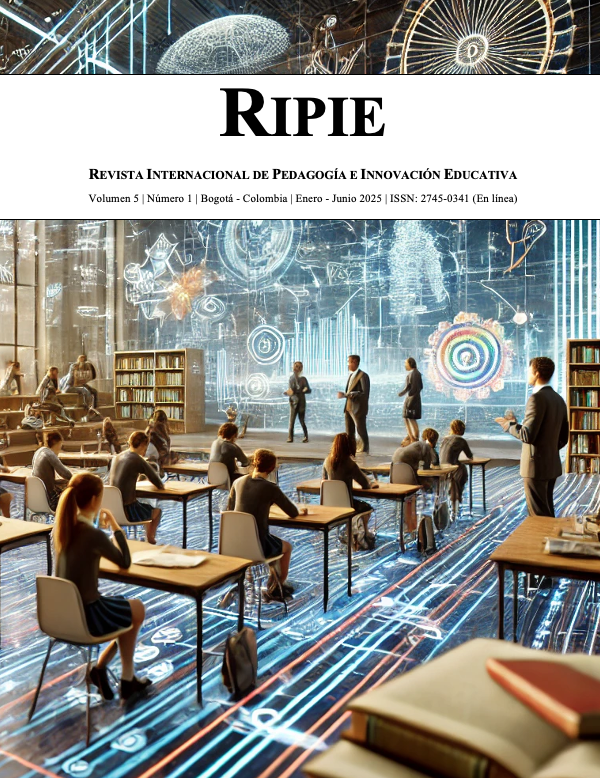Pedagogical innovation in Artificial Intelligence teaching
DOI:
https://doi.org/10.51660/ripie51226Keywords:
pedagogical innovation, artificial intelligence, teaching, learning, pedagogical strategies, pedagogical approachesAbstract
Pedagogical innovation in the teaching of artificial intelligence (AI) aims to address the challenges and opportunities of the digital era in education. The context includes the rapid evolution of AI and its impact on society, requiring adequate preparation of students. The research question is how innovative pedagogical strategies can enhance the understanding and application of AI. The objective is to analyze these interrelationships and highlight how an adaptive educational approach can benefit students. The main findings show that methods such as project-based learning and the use of AI technologies improve understanding and practical skills. Furthermore, integrating ethical and social considerations into the curriculum is crucial. In conclusion, pedagogical innovation promotes a more comprehensive and ethical education, preparing students to face the challenges of AI in today's society.
Downloads
References
Amershi, S., Weld, D., Vorvoreanu, M., Fourney, A., Nushi, B., Collisson, P., ... & Horvitz, E. (2019). Guidelines for human-AI interaction. In Proceedings of the 2019 CHI Conference on Human Factors in Computing Systems (pp. 1-13). https://doi.org/10.1145/3290605.3300233
Biggs, J., & Tang, C. (2011). Teaching for quality learning at university (4th ed.). Open University Press. https://doi.org/10.1017/CBO9781139169297
Binns, R. (2018). Fairness in machine learning: Lessons from political philosophy. Proceedings of the 2018 Conference on Fairness, Accountability, and Transparency, 149-159. https://doi.org/10.1145/3287560.3287586
Black, P., & Wiliam, D. (1998). Assessment and classroom learning. Assessment in Education: Principles, Policy & Practice, 5(1), 7-74. https://doi.org/10.1080/0969595980050102
Bozkurt, A., Xiao, J., Lambert, S., Pazurek, A., Crompton, H., Koseoglu, S., Farrow, R., Bond, M., Nerantzi, C., Honeychurch, S., Bali, M., Dron, J., Mir, K., Stewart, B., Costello, E., Mason, J., Stracke, C. M., Romero-Hall, E., Koutropoulos, A., … Jandrić, P. (2023). Speculative futures on ChatGPT and generative artificial intelligence (AI): A collective reflection from the educational landscape. Asian Journal of Distance Education, 18(1), 53-130. https://doi.org/10.5281/zenodo.7636568
Dastin, J. (2018). Amazon scraps secret AI recruiting tool that showed bias against women. Reuters.
D'Mello, S. K., & Graesser, A. C. (2012). AutoTutor and Affective AutoTutor: Learning by talking with cognitively and emotionally intelligent computers that talk back. ACM Transactions on Interactive Intelligent Systems (TiiS), 2(4), 1-39. https://doi.org/10.1145/2395123.2395128
Eubanks, V. (2018). Automating inequality: How high-tech tools profile, police, and punish the poor. St. Martin's Press. https://doi.org/10.1177/0095399717753360
Falmagne, J.-C., Albert, D., Doble, C., Eppstein, D., & Hu, X. (2013). Knowledge spaces: Applications in education. Springer. https://doi.org/10.1007/978-3-642-35329-5
Flores-Vivar, J. M., & García-Peñalvo, F. J. (2023). Reflections on the ethics, potential, and challenges of artificial intelligence in the framework of quality education (SDG4). Comunicar, 31(74), 35-44. https://doi.org/10.3916/C74-2023-03
Fullan, M. (2016). The new meaning of educational change (5th ed.). Teachers College Press.
Fullan, M., & Langworthy, M. (2014). A rich seam: How new pedagogies find deep learning. Pearson.
García-Peñalvo, F. J., Llorens-Largo, F., & Vidal, J. (2024). La nueva realidad de la educación ante los avances de la inteligencia artificial generativa. RIED-Revista Iberoamericana de Educación a Distancia, 27(1), 9-39.
Goodfellow, I., Bengio, Y., & Courville, A. (2016). Deep learning. MIT Press.
Hao, K. (2019). We need to solve AI's 'data crisis'—and look to neuroscience for answers. MIT Technology Review.
Harvard University. (2021). AI for social good.
Hattie, J. (2008). Visible learning: A synthesis of over 800 meta-analyses relating to achievement. Routledge. https://doi.org/10.4324/9780203887332
Hmelo-Silver, C. E., Duncan, R. G., & Chinn, C. A. (2013). Scaffolding and achievement in problem-based and inquiry learning: A response to Kirschner, Sweller, and Clark (2006). Educational Psychologist, 42(2), 99-107. https://doi.org/10.1080/00461520701263368
Luckin, R., Holmes, W., Griffiths, M., & Forcier, L. B. (2016). Intelligence unleashed: An argument for AI in education. Pearson.
Martínez Cardero, D. (2024). Fomento de la creatividad en programas de enseñanza de inteligencia artificial: análisis de 55 universidades. Artículo inédito. Universidad de las Ciencias Informáticas, Habana, Cuba.
MIT. (2019). AI, ethics, and society.
Mittelstadt, B. D., Allo, P., Taddeo, M., Wachter, S., & Floridi, L. (2016). The ethics of algorithms: Mapping the debate. Big Data & Society, 3(2), 1-21. https://doi.org/10.1177/2053951716679679
Nania, J., Bonilla, S., Woodbury, A., & Charrington, M. (2022). The state of AI education for K-12. Harvard Data Science Review, 4(3). https://doi.org/10.1162/99608f92.a8c5bed0
Navarro, M., Losada, D., & Gaviria, D. (2021). Innovación pedagógica y aprendizaje experiencial: Una mirada hacia la transformación del aprendizaje. Revista de Investigación en Pedagogía, 3, 27-40.
Ng, D. T. K., Lee, M., Tan, R. J. Y., Hu, X., Downie, J. S., & Chu, S. K. W. (2022). A review of AI teaching and learning from 2000 to 2020. Education and Information Technologies, In Press. https://doi.org/10.1007/s10639-022-11491-w
Perrault, R., Shoham, Y., Brynjolfsson, E., Clark, J., Etzioni, O., Grosz, B., ... & Manyika, J. (2019). The AI index 2019 annual report. AI Index Steering Committee, Human-Centered AI Institute, Stanford University.
Russell, S., & Norvig, P. (2020). Artificial intelligence: A modern approach (4th ed.). Pearson.
UNESCO. (2019). Artificial intelligence in education: Challenges and opportunities for sustainable development.
West, D. M. (2019). The role of AI in education: Current progress and future challenges. Brookings Institution. https://www.brookings.edu/research/the-role-of-ai-in-education-current-progress-and-future-challenges/
Woolf, B. P. (2021). Building intelligent interactive tutors: Student-centered strategies for revolutionizing e-learning. Morgan Kaufmann.
Downloads
Published
Issue
Section
License
Copyright (c) 2025 International Journal of Pedagogy and Educational Innovation

This work is licensed under a Creative Commons Attribution-NonCommercial-ShareAlike 4.0 International License.
Articles are published under the terms of a licence that permits use, distribution and reproduction in any medium, provided that the original work is properly cited. Ed&TIC retains the proprietary rights to the published works and actively promotes the reuse of these works under the terms of the aforementioned licence, which encourages the dissemination of knowledge and collaboration in the academic community.


